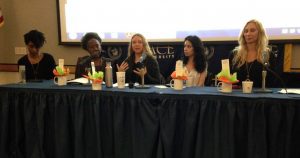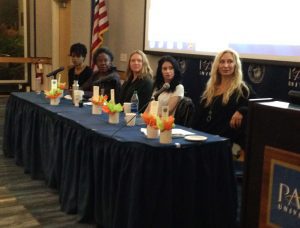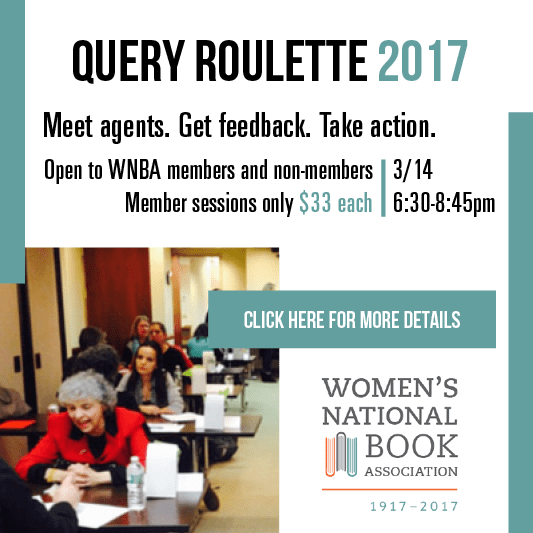by Hannah Bennett, WNBA-NYC Chapter President
“What can I do as a poet to humanize? [It] seems like such a simple concept, but it’s not, it’s so complex.” –Amy King, WNBA Award Winner
Poetry has a kind of healing power. It reflects a distilled version of our own deep sentiments—allows us to recognize ourselves in the words and rhythms of others.  As Rosebud Ben-Oni said, “It’s a way of belonging.” And perhaps it was that sense of community that made the panel at Pace University so special. We came together on a cold, rainy evening to discuss the Power of Poetry in a Complex World, and left bolstered by the powerful, talented women that graced the panel.
As Rosebud Ben-Oni said, “It’s a way of belonging.” And perhaps it was that sense of community that made the panel at Pace University so special. We came together on a cold, rainy evening to discuss the Power of Poetry in a Complex World, and left bolstered by the powerful, talented women that graced the panel.
Hosted jointly by Pace University and the NYC chapter of the Women’s National Book Association, in partnership with VIDA: Women in Literary Arts, the panel featured five astounding poets. Amy King (The Missing Museum) moderated the evening’s panel, which included Camille Rankine (Incorrect Merciful Impulses), Deborah Poe (the last will be stone, too), Rosebud Ben-Oni (Solecism), Ellease Ebele Oseye (Let the Lion Eat Straw), and Melissa Studdard (I Ate the Cosmos for Breakfast).

Dean Nira Herrmann
Each poet began the evening by reading a poem that was particularly meaningful to them. Spanning topics from a father’s death to societal inequity and police shootings, the poems they read were at once universal and deeply personal. King later asked the panel why they’d chosen their individual poems, and Camille Rankine explained, “In our day to day lives, there’s a lot that goes unacknowledged, unsaid, and unseen. […] It’s a way of calling out the reality of experience and sharing it.” Melissa Studdard added, “It’s a way to put my voice out there in the world. […] The idea that I could be a writer didn’t occur to me until I was in my twenties. […] I had absolutely no idea that a girl could be a writer.”
If poetry is a way to process our personal experiences, then this panel couldn’t have been more aptly timed. In a period of great national upheaval, November 9th’s panel reminded us of the role that poetry has played throughout our nation’s history. Just as citizens feel compelled to post and share our favorite verses, poets feel compelled to work. As Deborah Poe said, “[Poetry] does have the power to destabilize the foundation and potentially illicit change long term, and that is why I keep coming to the page.” Of poetry’s power to effect social change, Camille Rankine said this: “Literature is a way of introducing ourselves to each other. […] That is really the first step in activism.”
 These talented poets, too, had their literary heroes. The panelists were later asked to name some of their favorite and most inspiring poets. Audre Lorde, Layli Long Soldier, and Gwendolyn Brooks were some favorites that the entire panel could agree upon. Ellease Oseye also named Zora Neale Hurston, who was known for her prose, but whose poetic style taught Oseye, “how to come with grace to the moments of high tragedy in your life.”
These talented poets, too, had their literary heroes. The panelists were later asked to name some of their favorite and most inspiring poets. Audre Lorde, Layli Long Soldier, and Gwendolyn Brooks were some favorites that the entire panel could agree upon. Ellease Oseye also named Zora Neale Hurston, who was known for her prose, but whose poetic style taught Oseye, “how to come with grace to the moments of high tragedy in your life.”
As many of the panelists were also professors, the evening’s conversation ended on methods of teaching people to read poetry. Camille Rankine said that “We teach poetry like a problem that has an answer.” She and the other panelists hoped that teachers could find ways to make poetry less threatening for students, allowing students to pay attention to the feeling a poem evokes instead. Deborah Poe noted that multi-media poetry makes the medium more attractive and understandable to students, and Melissa Studdard suggested that teaching people to write poetry ultimately teaches them to appreciate reading it.
“Events like this one are always empowering reminders that there are others who look to poetry and the arts to make sense of their worlds and contribute to the conversation,” said audience member Sarah Woodruff (HarperCollins). “Slowing down to devote time to critical thinking and open discussion is often a rare opportunity, and these six women offered thoughtful takes on why poets take to the page, and the importance of these voices in adding to the public discourse.”
Personally, I left with a heightened appreciation for the work that these women do. Their words serve as guiding lights for those of us at sea. Rosebud Ben-Oni said it beautifully when asked about the poet’s responsibility to point out what’s really happening in the world: “I think the best poets just can’t help it.”
- L to R: Camille Rankine, Ellease Ebele Oseye, Deborah Poe, Rosebud Ben-Oni, Melissa Studdard
- L to R: Camille Rankine, Ellease Ebele Oseye, Deborah Poe, Rosebud Ben-Oni, Melissa Studdard
- Panel Table
- Dean Nira Herrmann
- L to R: Camille Rankine, Ellease Ebele Oseye, Deborah Poe, Rosebud Ben-Oni, Melissa Studdard, Amy King
- L to R: Ellease Ebele Oseye, Deborah Poe, Rosebud Ben-Oni, Melissa Studdard
- L to R: Camille Rankine, Ellease Ebele Oseye, Deborah Poe, Rosebud Ben-Oni, Melissa Studdard
 Hannah Bennett is the Managing Editor at RosettaBooks, where she co-manages the Editorial, Production, and Design department. She is a member of the Pace University M.S. in Publishing program advisory board, and was a speaker at Pace’s 4th Annual International Conference on the Publishing Industry in Wuhan, China in 2014. Hannah holds a B.A. in Communications and Dramatic Arts from the University of North Carolina at Chapel Hill and an M.S. in Publishing from Pace University in New York City. In her spare time, Hannah is a writer and musician, and can occasionally be seen reading or performing in venues around New York City.
Hannah Bennett is the Managing Editor at RosettaBooks, where she co-manages the Editorial, Production, and Design department. She is a member of the Pace University M.S. in Publishing program advisory board, and was a speaker at Pace’s 4th Annual International Conference on the Publishing Industry in Wuhan, China in 2014. Hannah holds a B.A. in Communications and Dramatic Arts from the University of North Carolina at Chapel Hill and an M.S. in Publishing from Pace University in New York City. In her spare time, Hannah is a writer and musician, and can occasionally be seen reading or performing in venues around New York City.











